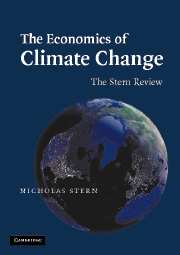Book contents
- Frontmatter
- Contents
- Preface
- Acknowledgements
- Introduction
- Summary of Conclusions
- Part I Climate Change – Our Approach
- 1 The Science of Climate Change: Scale of the Environment Challenge
- 2 Economics, Ethics and Climate Change
- 2A Ethical Frameworks and Intertemporal Equity
- Part II Impacts of Climate Change on Growth and Development
- Part III The Economics of Stabilisation
- Part IV Policy Responses for Mitigation
- Part V Policy Responses for Adaptation
- Part VI International Collective Action
- Abbreviations and Acronyms
- Postscript
- Technical Annex to Postscript
- Index
1 - The Science of Climate Change: Scale of the Environment Challenge
Published online by Cambridge University Press: 05 March 2014
- Frontmatter
- Contents
- Preface
- Acknowledgements
- Introduction
- Summary of Conclusions
- Part I Climate Change – Our Approach
- 1 The Science of Climate Change: Scale of the Environment Challenge
- 2 Economics, Ethics and Climate Change
- 2A Ethical Frameworks and Intertemporal Equity
- Part II Impacts of Climate Change on Growth and Development
- Part III The Economics of Stabilisation
- Part IV Policy Responses for Mitigation
- Part V Policy Responses for Adaptation
- Part VI International Collective Action
- Abbreviations and Acronyms
- Postscript
- Technical Annex to Postscript
- Index
Summary
KEY MESSAGES
An overwhelming body of scientific evidence now clearly indicates that climate change is a serious and urgent issue. The Earth's climate is rapidly changing, mainly as a result of increases in greenhouse gases caused by human activities.
Most climate models show that a doubling of pre-industrial levels of greenhouse gases is very likely to commit the Earth to a rise of between 2–5°C in global mean temperatures. This level of greenhouse gases will probably be reached between 2030 and 2060. A warming of 5°C on a global scale would be far outside the experience of human civilisation and comparable to the difference between temperatures during the last ice age and today. Several new studies suggest up to a 20% chance that warming could be greater than 5°C.
If annual greenhouse gas emissions remained at the current level, concentrations would be more than treble pre-industrial levels by 2100, committing the world to 3–10°C warming, based on the latest climate projections.
Some impacts of climate change itself may amplify warming further by triggering the release of additional greenhouse gases. This creates a real risk of even higher temperature changes.
Higher temperatures cause plants and soils to soak up less carbon from the atmosphere and cause permafrost to thaw, potentially releasing large quantities of methane.
Analysis of warming events in the distant past indicates that such feedbacks could amplify warming by an additional 1–2°C by the end of the century.
- Type
- Chapter
- Information
- The Economics of Climate ChangeThe Stern Review, pp. 3 - 24Publisher: Cambridge University PressPrint publication year: 2007
- 2
- Cited by

